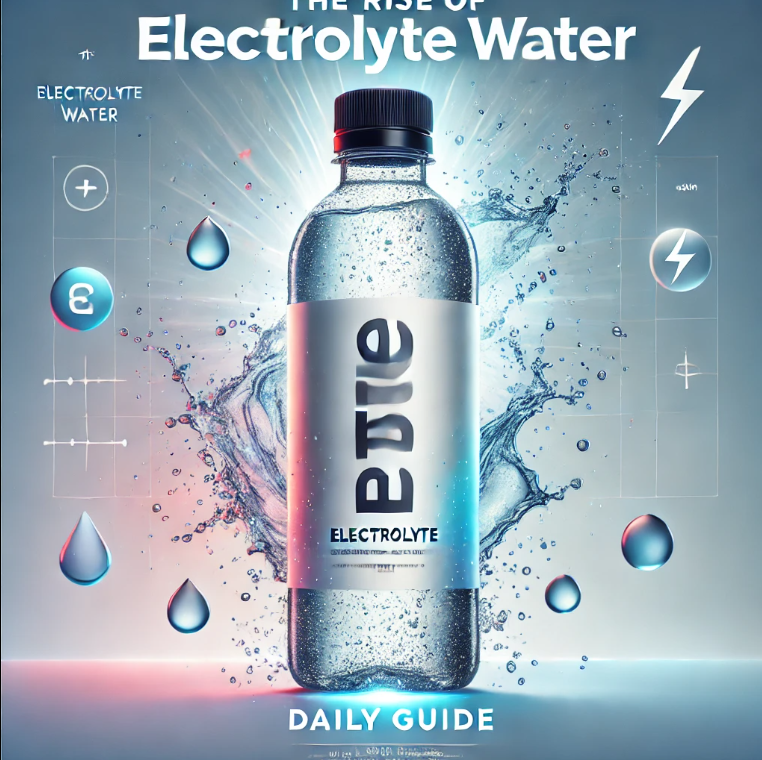Electrolyte water has become increasingly popular in recent years, touted as a powerful way to stay hydrated and replenish essential nutrients. From fitness enthusiasts to casual consumers, many people are turning to this enhanced water for its purported benefits. But what exactly is electrolyte water, and should you make it a daily habit? Let’s dive deep into the science, benefits, potential risks, and frequently asked questions to help you decide.
What is Electrolyte Water?
Electrolyte water is regular water infused with minerals like sodium, potassium, calcium, and magnesium. These minerals are essential for maintaining various bodily functions, such as muscle contractions, nerve signaling, and fluid balance. Unlike plain water, electrolyte water helps replenish lost minerals, particularly after intense physical activity or dehydration.
Benefits of Electrolyte Water
1. Improved Hydration
Electrolytes like sodium and potassium enhance water absorption, making electrolyte water an excellent choice for staying hydrated. Many people ask, “Do electrolytes hydrate you faster than water?” The answer is yes; electrolyte water can speed up hydration by replenishing the minerals lost through sweat or illness.
2. Supports Muscle Function
Electrolytes play a vital role in muscle contraction and relaxation. Drinking water with added electrolytes can help prevent muscle cramps, especially during or after workouts.
3. Electrolytes Benefits for Skin
Electrolyte water contributes to better skin hydration, improving skin elasticity and reducing dryness. When your body’s hydration levels are optimal, your skin appears healthier and more radiant.
4. Enhanced Physical Performance
Athletes and fitness enthusiasts benefit significantly from electrolyte water. It not only keeps them hydrated but also replenishes energy lost during intense exercise sessions.
Can You Drink Electrolyte Water Every Day?
“Can I drink electrolyte water every day?” is a common question. For most people, daily consumption is safe and even beneficial, particularly if they’re active or prone to dehydration. However, excessive intake can lead to imbalances, causing symptoms of too much electrolytes, such as nausea, muscle twitching, or confusion. Moderation is key.
How Many Electrolyte Drinks Per Day?
The number of electrolyte drinks you should consume depends on your activity level, climate, and overall health. For sedentary individuals, one bottle per day is typically sufficient. Athletes or those in hot climates may need 2-3 servings. Consult with a healthcare provider if you’re unsure about your specific needs.
Symptoms of Too Much Electrolytes
While electrolytes are crucial for health, overconsumption can have adverse effects. Common symptoms of too much electrolytes include:
- Fatigue
- Nausea
- Irregular heartbeat
- Muscle weakness
If you’re experiencing these symptoms, reduce your intake and consult a healthcare professional.
Water with Electrolytes Side Effects
While generally safe, some people might experience side effects from electrolyte water, including:
- Bloating: Excess sodium can cause water retention.
- Upset Stomach: Certain formulations may irritate sensitive stomachs.
- Kidney Strain: High mineral intake can burden the kidneys, especially in individuals with pre-existing conditions.
Do Electrolytes Hydrate You Faster Than Water?
Electrolyte water is designed to hydrate faster than plain water. This is because the added minerals facilitate fluid absorption in the body, making it particularly effective for those experiencing dehydration.
How to Make Electrolyte Water at Home
For a cost-effective and customizable option, you can make electrolyte water at home. Here’s a simple recipe:
| Ingredient | Quantity |
|---|---|
| Water | 1 liter |
| Sea salt | ½ teaspoon |
| Honey or sugar | 1 tablespoon |
| Lemon juice | 2 tablespoons |
Mix all ingredients thoroughly and enjoy! Adjust the sweetness and saltiness to your preference.
Electrolytes Benefits for Skin
Dehydrated skin can lead to dryness, flaking, and an uneven texture. Regular consumption of electrolyte water can boost skin hydration, improve elasticity, and promote a healthy glow. This is especially beneficial in dry or hot climates.
Can You Take Electrolytes on an Empty Stomach?
Yes, you can take electrolytes on an empty stomach, but some people may experience mild nausea. If this occurs, try consuming them with a small snack or meal.

Comparing Plain Water and Electrolyte Water
| Feature | Plain Water | Electrolyte Water |
| Hydration Speed | Moderate | Faster |
| Mineral Content | Minimal | High |
| Suitable for Exercise | Limited | Ideal |
| Skin Benefits | Indirect | Direct |
FAQs About Electrolyte Water
1. Can I drink electrolyte water every day?
Yes, but moderation is essential. Excessive consumption may cause imbalances.
2. How many electrolyte drinks per day?
1-3 servings depending on your activity level and hydration needs.
3. What are the symptoms of too much electrolytes?
Common symptoms include fatigue, muscle weakness, and irregular heartbeat.
4. Do electrolytes hydrate you faster than water?
Yes, they facilitate faster fluid absorption in the body.
5. What are the side effects of water with electrolytes?
Side effects may include bloating, upset stomach, or kidney strain in excessive amounts.
6. How to make electrolyte water at home?
Mix water, sea salt, lemon juice, and a sweetener like honey or sugar.
7. What are electrolytes benefits for skin?
They help improve skin hydration, elasticity, and overall health.
8. Can you take electrolytes on an empty stomach?
Yes, though some people might experience mild discomfort.
Final Thoughts
Electrolyte water offers numerous benefits, from improved hydration to better skin health and enhanced physical performance. However, it’s crucial to consume it responsibly to avoid potential side effects. Whether you’re an athlete or simply looking to boost your hydration, electrolyte water can be a valuable addition to your routine. Always consider your specific needs and consult a healthcare professional if in doubt.

